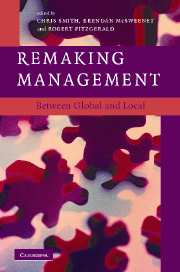Book contents
- Frontmatter
- Contents
- List of tables
- Notes on contributors
- 1 Remaking management: neither global nor national
- Part I Conceptualising International and Comparative Management
- Preface: Dominance, diversity and the historical process in management practice
- 2 Work organisation within a dynamic globalising context: a critique of national institutional analysis of the international firm and an alternative perspective
- 3 Cultural diversity within nations
- 4 Business systems, institutions and economic development: the value of comparison and history
- Part II Systems in Transition
- Part III Society as Open and Closed
- Part IV The Search for Global Standards
- Index
4 - Business systems, institutions and economic development: the value of comparison and history
Published online by Cambridge University Press: 06 July 2010
- Frontmatter
- Contents
- List of tables
- Notes on contributors
- 1 Remaking management: neither global nor national
- Part I Conceptualising International and Comparative Management
- Preface: Dominance, diversity and the historical process in management practice
- 2 Work organisation within a dynamic globalising context: a critique of national institutional analysis of the international firm and an alternative perspective
- 3 Cultural diversity within nations
- 4 Business systems, institutions and economic development: the value of comparison and history
- Part II Systems in Transition
- Part III Society as Open and Closed
- Part IV The Search for Global Standards
- Index
Summary
Introduction: making and remaking management
Most people think, at some level, that history matters. Personal genealogy is, for many, an issue of significance. Some have a natural interest in the values and circumstances of the past, since they can highlight contrasts with their own lives; others look for insight into the concerns and controversies of the present, and hold them up to the test of former achievements and follies. There is, moreover, a human tendency to regard the policies of specific interest groups or social change as more acceptable once associated with established traditions or an ‘unstoppable’ course of events (Hobsbawm and Ranger, 1983). Conversely, historical research should be a powerful corrective to ‘invented traditions’, the assumption of ‘inevitable’ outcomes or the idea of ‘natural’ solutions for a given society. Detailed evidence frequently disinters the complexity of the past. It throws boulders in the path of simple, linear explanations; it reveals the limits of generalisations when applied too easily to whole societies; it questions attempts to identify and date significant periods of change, when based on a single event or trend; it prefers instead the numerous and frequently contradictory factors that influence the process of change; and it raises the problem of distinguishing ‘long-term’ or more consequential developments from those that are ‘short-term’. Close analysis discloses the uncertainty of the past, in which decisions and institutional settlements are the result of contest, subject to later challenges and, in actuality, ‘conflicted’ rather than general or ‘natural’.
- Type
- Chapter
- Information
- Remaking ManagementBetween Global and Local, pp. 90 - 118Publisher: Cambridge University PressPrint publication year: 2008
- 1
- Cited by



